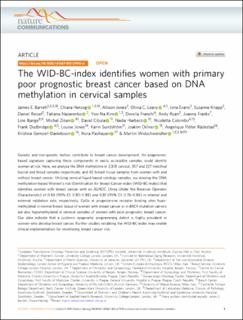| dc.contributor.author | Barrett, James E. | |
| dc.contributor.author | Herzog, Chiara | |
| dc.contributor.author | Jones, Allison | |
| dc.contributor.author | Leavy, Olivia C. | |
| dc.contributor.author | Evans, Iona | |
| dc.contributor.author | Knapp, Susanne | |
| dc.contributor.author | Reisel, Daniel | |
| dc.contributor.author | Nazarenko, Tatiana | |
| dc.contributor.author | Kim, Yoo-Na | |
| dc.contributor.author | Franchi, Dorella | |
| dc.contributor.author | Ryan, Andy | |
| dc.contributor.author | Franks, Joanna | |
| dc.contributor.author | Bjørge, Line | |
| dc.contributor.author | Zikan, Michal | |
| dc.contributor.author | Cibula, David | |
| dc.contributor.author | Harbeck, Nadia | |
| dc.contributor.author | Colombo, Nicoletta | |
| dc.contributor.author | Dudbridge, Frank | |
| dc.contributor.author | Jones, Louise | |
| dc.contributor.author | Sundström, Karin | |
| dc.contributor.author | Dillner, Joakim | |
| dc.contributor.author | Rådestad, Angelique Flöter | |
| dc.contributor.author | Gemzell-Danielsson, Kristina | |
| dc.contributor.author | Pashayan, Nora | |
| dc.contributor.author | Widschwendter, Martin | |
| dc.date.accessioned | 2022-10-10T12:09:13Z | |
| dc.date.available | 2022-10-10T12:09:13Z | |
| dc.date.created | 2022-05-19T13:31:44Z | |
| dc.date.issued | 2022 | |
| dc.identifier.issn | 2041-1723 | |
| dc.identifier.uri | https://hdl.handle.net/11250/3025110 | |
| dc.description.abstract | Genetic and non-genetic factors contribute to breast cancer development. An epigenome-based signature capturing these components in easily accessible samples could identify women at risk. Here, we analyse the DNA methylome in 2,818 cervical, 357 and 227 matched buccal and blood samples respectively, and 42 breast tissue samples from women with and without breast cancer. Utilising cervical liquid-based cytology samples, we develop the DNA methylation-based Women’s risk IDentification for Breast Cancer index (WID-BC-index) that identifies women with breast cancer with an AUROC (Area Under the Receiver Operator Characteristic) of 0.84 (95% CI: 0.80–0.88) and 0.81 (95% CI: 0.76–0.86) in internal and external validation sets, respectively. CpGs at progesterone receptor binding sites hypomethylated in normal breast tissue of women with breast cancer or in BRCA mutation carriers are also hypomethylated in cervical samples of women with poor prognostic breast cancer. Our data indicate that a systemic epigenetic programming defect is highly prevalent in women who develop breast cancer. Further studies validating the WID-BC-index may enable clinical implementation for monitoring breast cancer risk. | en_US |
| dc.language.iso | eng | en_US |
| dc.publisher | Nature | en_US |
| dc.rights | Navngivelse 4.0 Internasjonal | * |
| dc.rights.uri | http://creativecommons.org/licenses/by/4.0/deed.no | * |
| dc.title | The WID-BC-index identifies women with primary poor prognostic breast cancer based on DNA methylation in cervical samples | en_US |
| dc.type | Journal article | en_US |
| dc.type | Peer reviewed | en_US |
| dc.description.version | publishedVersion | en_US |
| dc.rights.holder | Copyright 2022 The Author(s) | en_US |
| dc.source.articlenumber | 449 | en_US |
| cristin.ispublished | true | |
| cristin.fulltext | original | |
| cristin.qualitycode | 2 | |
| dc.identifier.doi | 10.1038/s41467-021-27918-w | |
| dc.identifier.cristin | 2025643 | |
| dc.source.journal | Nature Communications | en_US |
| dc.identifier.citation | Nature Communications. 2022, 13, 449. | en_US |
| dc.source.volume | 13 | en_US |

